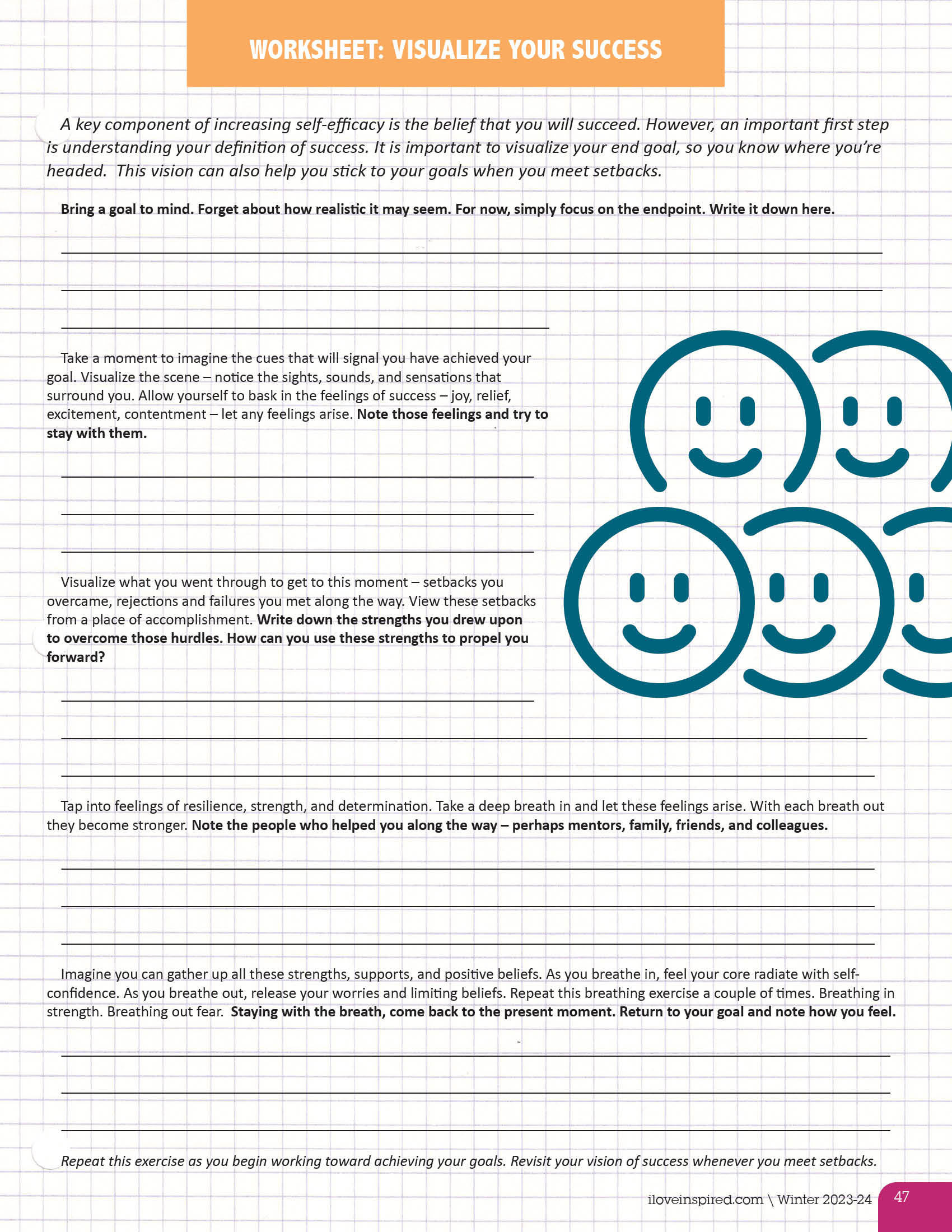Mental Health: You are Worthy – Believing in Yourself
We are all worthy. We are valuable exactly as we are in this moment.
But sometimes we have trouble seeing our self-worth; trouble believing in ourselves.
Worth is a tricky thing. When it comes to the worth of objects, it makes sense to question the value of something. We compare options in order to make the best choice. Yet, when we translate that logic to our own sense of worth, we can run into complicated emotions.
Let’s put it into practice: Think about the phrase “I am worthy.” Notice all the thoughts, emotions, and images that arise. Take a moment to write them down; this is important information that we’ll come back to later.

Cultivating Self-Worth
Self-worth starts from the inside. The first step in believing in yourself and your inherent worthiness – regardless of your circumstances, effort, or outside factors – is learning how to separate your internal worth from the views of the external world. Using external factors as a self-worth barometer is, in and of itself, counterproductive.
When you believe in your worth, you can move confidently through the world without asking for permission. You tackle challenges with strength, meet setbacks with resilience, and allow your inner wisdom to guide your choices.
However, acknowledging self-worth is not always a practice we are taught. This is especially true for people whose parents struggled with their own self-worth.
Luckily, it is never too late to develop skills to help strengthen your internal sense of worthiness. As you work on building a more secure relationship with yourself, make sure to give yourself grace – creating new habits and perspectives is rarely easy.
Believe in Yourself
Self-efficacy is a person’s belief in themselves. People with high self-efficacy possess a combination of confidence in their abilities, determination to overcome barriers, and motivation to stay steadfast in the pursuit of their goals.
Self-worth and self-efficacy are two separate things, but they can reinforce one another. For example, our sense of inherent worthiness can help us meet setbacks with resilience and determination. High self-worth can also give us the strength to leave situations and relationships that are no longer serving us. It is easier to believe in ourselves when we know our worth.
Just like with self-worth, we can increase our self-efficacy with internal work. This includes developing a growth mindset – or the belief that you are capable of change. Your struggles do not define you. Just because you have not achieved greatness yet does not mean you never will. The key word is yet. Instead of saying, “I cannot do this,” try saying, “I cannot do this, yet.”
It can be easy to become overwhelmed when we look at the space between where we are and where we want to be. It is important to remember that our worth is not attached to our success. Instead, we can rely on our inherent sense of worth to propel us toward reaching our goals, one step at a time.

You are Worthy of Care
Self-care has been a buzz phrase in the mental health space for years. Rightfully so, but it’s important to understand the totality of what it means to care for yourself.
Holistic self-care starts with a foundation of six basic dimensions: physical, spiritual, financial, mental, emotional, and social. Many of us have an area of self-care where we thrive and one that we often neglect. Self-care is not about perfection.
You can begin to practice self-care by mentally checking in with yourself each day, or several times per day. You can start with a question, “How am I doing (physically, spiritually, financially, mentally, emotionally, socially)?”
Be careful not to judge whatever answer arises. Instead, develop a plan. If you’re feeling mentally drained set limits (when possible) to reduce your mental load. If you’re feeling physically tired it’s ok to skip a workout, take a nap, or simply relax. Maybe you notice you’re feeling lonely and in need of a social connection. Or perhaps your social battery is tapped, and you could use a night in.
Whenever possible, work to honor and meet your own needs. This practice is like strengthening a muscle. It takes patience and repetition, but if you keep at it, you will notice results.
It is ok (and even necessary) to care for yourself. You are worthy of care.
You are Worthy of Forgiveness
When we love and accept ourselves it becomes much easier to forgive – others and ourselves. When we operate from a place of high self-worth, we don’t expect perfection. You will fail at things, get rejected, and make mistakes. That is part of being human.
Self-forgiveness means acknowledging that in order to fail, we must first try. Regardless of the outcome, our efforts are worthwhile. Our worth is not dependent on success.
People with a high degree of self-efficacy look at failure as an opportunity to reflect or redirect. They might view rejection as a sign it’s time to try a different approach. As you practice increasing your own self-efficacy, try to view failures with forgiveness.
In Hawaiian culture, there is a prayer called Ho’oponopono, which means “to make things right.” It is both a practice of reconciling with others as well as self-forgiveness. You practice it by repeating this mantra, “I am sorry. Please forgive me. I thank you. I love you.”
As you start to practice self-forgiveness, you might imagine directing those words toward yourself. Notice what emotions arise without judgement. You are worthy of forgiveness.

Affirm Your Worth
Our thoughts are powerful. It’s important to watch what is happening inside of our minds. If you’ve struggled with low self-worth for many years, your thoughts about yourself are likely negative.
Thought patterns can feel like an automatic, unconscious process. However, we are capable of controlling, redirecting, and even changing the way we think, but it takes practice.
If you want to shift your thinking, you have to notice your patterns first. Think back to the start of this article. What thoughts, emotions, and images related to your internal worth arose? This is where you will need to begin.
Practice shifting your thoughts whenever you catch a negative thought. Replace that negative thought with a positive (often just the opposite). Repeat as often as necessary.
You might develop affirmations that help to strengthen your self-worth. These can include statements or written reminders such as, “I am worthy of love,” “I am capable of caring for myself,” or “I am good enough as I am.”
At the same time, you can develop positive self-beliefs that strengthen your ability to achieve your goals. Some examples might be, “My failures do not define me,” “I am capable of achieving my goals,” or “I am worthy of success.”
The mind does not know the difference between thoughts and reality. Replacing negative or limiting beliefs with positive affirmations can be a powerful practice.
Honor your Worth
While self-worth is an inside job, outside forces can certainly influence our feelings of worthiness. It’s important to recognize that there are jobs, relationships, and circumstances that challenge our sense of self-worth.
No self-worth practice is strong enough to withstand repeated encounters with people or places that make us feel small, insignificant, or worthless. In these circumstances, an external change is often required before internal changes can stick.
In some circumstances, boundaries and assertive communication can help. In others, drastic changes may be needed. These scenarios may require the help of a professional, such as a therapist.
Take a mental inventory of the people in your life who contribute to your sense of worthiness. Who do you turn to when you start to question your worth? Where do you go when you want to feel confident or secure?
It is important to surround yourself with people that recognize and cherish your worth. These are the people who reinforce your worth when you face self-doubt. You are so worthy of these kinds of relationships.

Olivia Lynn Schnur













